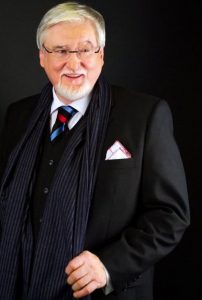A Talk With Michael Löhner

Michael Löhner has been shaping the development of managers and corporate cultures in the German-speaking world for many years. His clients include the management boards of DAX companies, as well as medium-sized companies and entrepreneurs. His view of the world is shaped by the sharp logic of the Jesuit order, his teacher was the philosopher and Jesuit priest Rupert Lay himself. Michael Löhner is the author of numerous publications. He wrote the books Unternehmen heißt Denken (Business is thinking), Unternehmen heißt lernen (Business means thinking) and Führung neu denken (Rethink leadership).
Committed Leadership: Mr. Löhner, the lead story on our website is similar to one of your books: Rethinking Leadership. Hasn’t everything been said, written and taught about leadership?
Michael Löhner: You are right, the amount of literature and teachings on excellent management is enormous and still seems to be growing exponentially. But we must not forget that leadership still includes people who take on the role of leaders. And these are not always the same over time. Young managers with a completely different understanding of the world are joining the ranks, while older managers with their knowledge accumulated over many decades are leaving. People who have been led for many years are promoted to leaders. In addition, our world is constantly changing, and at an ever increasing speed. Leadership concepts that were right 20 years ago no longer work today. It is therefore always time to rethink leadership. Your website and my book have lost nothing of their relevance. But it is not enough to just rethink, we also have to understand and apply what we have learned. In this respect, my book Unternehmen heißt lernen, is perhaps the more decisive work that should be pointed out at this point.
Committed Leadership: The keyword “learning” is one that we like to take up. At the moment, it seems we have to relearn how to deal with fear. Up to now, as the structures of most large German corporations are designed, fear, or the uncertainty that causes fear, has been countered by control and steering. True to the motto: What I can control no longer scares me. This works increasingly poorly in a world that is changing ever faster and becoming ever more complex. And the corona virus also shows us the limits of controllability.
Michael Löhner: We are currently experiencing the feeling of loss of control to an unusual extent. At the moment, we feel irritated by a complexity that overtaxes our previous attitudes and habits. Our social world has been changed by rules of distance and isolation, and the rational orientation towards knowledge and logic has been partially suspended. The emotional security between hope and fear is not sustainable and our search for meaning and anchor in the crisis can hardly choose between the offers. In general we only know: In difficult situations everything is right and good that benefits other people.
Committed Leadership: What is important as a leader now?
Michael Löhner: Managers need two special skills at the moment: They must be able to build trust and they must be able to reduce fear. The development of both skills has a consciousness and an interactional dimension. Why do I say that? Because they are both fields of competence that can be trained very successfully, for example in coaching sessions. I believe that this is the appropriate response to the current uncertainties.
Committed Leadership: Is it then more important to start reducing fear in oneself or is it sufficient for a leader to radiate security so that employees lose their fear?
Michael Löhner: Of course it is very helpful if managers are not driven by fear, even in the current situation. Then it is naturally easier for them to radiate calm and composure. But regardless of whether or not you bring this advantage of calmness with you, it is important at the moment, as a manager, to take the fear out of the employees. It is very helpful to rely on natural authority, not hierarchical or professional authority. I define natural authority as the ability to have a charisma to which other people give voluntary and respectful allegiance.
People lose their fear when they have someone with whom they can talk about fear without fear. The best learning process in the development of a personality is not the change of oneself, but the ability to change others. If I am able to take fear away from people in a technical, disciplined way, I lose it myself. That is why my motto is: “Learning by teaching”. You don’t have to be able to do everything you want to do with people, but you must be able to do it with others. That can be learned.
Committed Leadership: Probably it will not be enough just to take fears. What else do I need as a leader?
Michael Löhner: Plato said that you only have two enemies – and they are more topical than ever: First, loss of reality in planning and decision-making, i.e. I plan something and decide something that will fail because of reality, and second, loss of majority. If I can’t implement what I’ve recognized on my own, then I have to be able to put people behind it. Otherwise I will fail.
Dealing with both enemies can be learned in personality trainings.
Committed Leadership: The loosening up after the great restrictions in the course of containing the spread of the corona virus is just increasing and you notice how everyone is longing for the old normality to return. Can we promise our employees that we will return to this old normality?
Michael Löhner: We should not. Do you know the story of Orpheus and Eurydice? Orpheus lost Eurydice for good because he did not look ahead consistently enough. I love this saga because it illustrates one thing very clearly: that nothing will ever be the same again. Turning around and looking back is fatal. Only a determined look ahead will lead us into the new world of Corona.
Committed Leadership: Mr Löhner, thank you very much for this interview!
Short version of the legend of Orpheus and Eurydice
Orpheus was infinitely in love with the Greek nymph Eurydice.
One day she was bitten by a snake and died. Orpheus was seized by an infinite sadness and could not sleep. He decided to wander to the end of the world, where he was thought to have entered the realm of the dead. He stood before the entrance, called for his wife and sang the most heartwarming songs. Finally the ferryman took him to the other side into the underworld. Orpheus succeeded in convincing the guardians of the underworld to take Eurydice up to the realm of the living. But on condition that he would not look for her once until they both saw the light of day again. Orpheus went ahead, Eurydice followed him. When they had already seen the light, Orpheus, fearing that Eurydice was no longer behind him, turned around to look for her. At that moment, Orpheus lost Eurydice forever.


